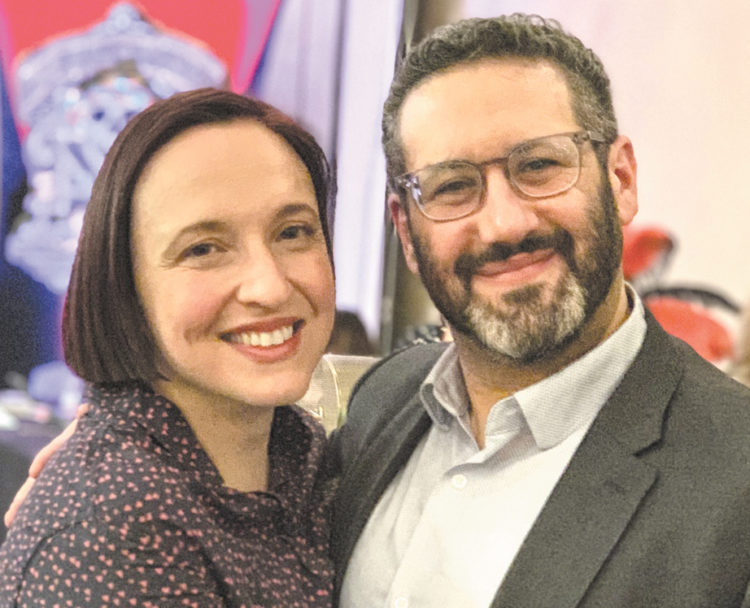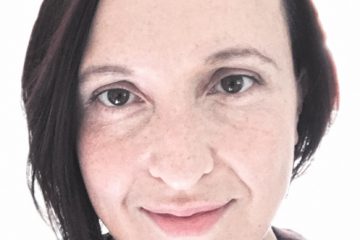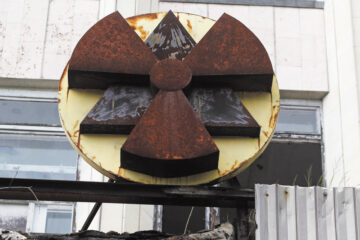A ketubah conversation

A Bisel Kisel with Masha Kisel, The Dayton Jewish Observer
I grew up in the Soviet Union in the 1980s and immigrated to Chicago, where I struggled to fit into a suburban Jewish private school. My husband, Sam Dorf, grew up in the vibrant Jewish community of Brookline, just outside Boston. Over 13 years of marriage, we have been discussing how our experiences have shaped our approach to Jewish traditions. Here, we share our conversation about Purim.
Sam: So, tell me about growing up in Chicago and your Purim experiences. Did you ever dress up?
Masha: In sixth grade, my friend Eugenia, another Russian-speaking immigrant, and I dressed up as Slash and Axl Rose from Guns n’ Roses. I copied the words and design from the back of their album onto white T-shirts. I wrote Guns n’ f’n Roses on the back, only vaguely realizing that there was a bad word in there. A sock stuffed in the front of my black bike shorts recreated Axl Rose’s famous bulge. Eugenia, as Slash, brought an empty Jack Daniels bottle filled with apple juice, which the teachers immediately confiscated as we yelled, “It’s just apple juice!” It felt wonderful to be that irreverent.
Sam: That’s amazing.
Masha: My best memories from Solomon Schechter Day School are of mischief and of getting away with it because as “Russian immigrants,” we were considered too clueless to bear any real responsibility. But the teachers were right in that I was culturally tone-deaf as a tween. I imitated TV and magazines to be “American,” with little discernment of context. What are your memories of Purim in Brookline?
Sam: I remember going to services when I was 10 and seeing a man dressed as a dead Laura Palmer from the TV show Twin Peaks. He painted his face a ghastly purple, wore a tiara, and wrapped himself in plastic. I still have nightmares about that. But I only dressed up when I was in the Purim shpiel. One year I played Haman and the next year I got to play King Ahashverus.
Masha: Which role did you prefer?
Sam: To be honest, I liked playing the bad guy, but it did force me to reflect on the weird cruelty of the holiday, with all the booing and noise making directed at me. I vividly remember the sudden fear I had of stepping on stage and getting heckled by a congregation.
Masha: Some people interpret those sounds as a joyful celebration of our survival. Do you buy that?
Sam: I can see that, but there is danger in providing an effigy for that anger, especially in these politically divisive times. I get the fun of safely reviling a villain long dead, but it still makes me uncomfortable.
Masha: Maybe the booing is an expression of helplessness, rage against the inability to improve one’s own fate. That was the experience of the Jewish people in ancient Persia. What’s your take on Esther masquerading as a non-Jew to marry the king? He only listened to her because he was in a sex fog. Ultimately, Esther could only speak for her people because her true identity was hidden behind her beauty. Doesn’t that make you angry?
Sam: Absolutely, there is a lot of fear right now about showing visible signs of Jewishness in public, like wearing a kipah or a Magen David. In the end, though, Esther revealed who she was. That’s what makes her the hero. What did you think of your first Purim service as a newly arrived Soviet immigrant?
Masha: The first religious service I ever attended at a synagogue was a Megillah reading at B’nai Zion, located right across the street from our Chicago apartment. The groggers initially disturbed me, but I got into it by the end of the service. Coming from a Soviet environment with a long history of show trials and denouncements, it wasn’t all that strange to see a formerly powerful official desecrated in this way. Public shaming permeated my childhood, especially at school. It wasn’t unusual for an entire class to collectively heckle a student at a teacher’s request, for tardiness or spilling an inkwell (we still used quills in the 1980s). I don’t want our children to participate in any form of public shaming as victims or perpetrators.
Sam: Agreed. So no groggers, no booing for our kids. But what should they do? I keep on thinking about what Barack Obama said during the 2016 election when a crowd of supporters booed Donald Trump. He said, “Don’t boo; vote!” I wonder if there is a modern way to do that this Purim?
Masha: You’re the one who always brings up Sister Helen Prejean’s words: “people are more than the worst thing they have ever done in their lives.” She obviously condemns murder, but has spent her life fighting against the death penalty. Would it be a bad thing to distinguish between a person’s humanity and their deeds?
Sam: Hmmm, that’s a great question.
Masha: We can condemn evil actions without staining our own moral conscience with hatred. My great-grandmother used to tell a story about refusing to spit on Stalin’s grave when it became fashionable after the denouncement by Khrushchev. She detested the mob mentality, which revered Stalin while he was alive, but turned on him with the political tide. These days, all I want to do is boo. But I’d like our family’s Judaism to be a cultivation of gentleness and forgiveness, despite the world’s brutality. You’re better at forgiveness than I am, but I’m learning.
Masha Kisel is a lecturer in English at the University of Dayton. Her husband, Sam Dorf, is an associate professor of musicology at UD.
To read the complete March 2020 Dayton Jewish Observer, click here.





